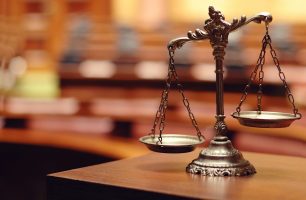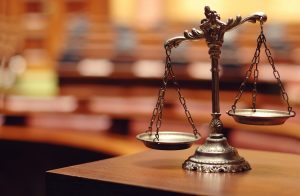This literary essay is written by one of my grade 11 students. She has stated a very clear thesis about the impact of the judicial system on Boo, the main character in the novel, Boo. She has included very clear quotes from the novel and provided accurate explanations and conclusions. Her analysis clearly shows how Boo’s life would be like if he was tried in a fair court with certified judges and representatives. She makes a connection to the real world when she states that readers should never take the justice system in Canada for granted.
Unjust Judiciary
A fair and efficient judicial system not only helps to ensure a safe and peaceful society but also protects the basic individual rights and freedoms. However, the presence of a fair judiciary is taken for granted until one encounters blatant violations of human rights in societies that lack such a system. One such society is Town in the novel by Neil Smith, titled Boo, which hints at the importance of a fair judicial system through portraying the failure of the justice system, leading to the main character, Johnny’s wrongful conviction of murder. A series of emotional events that begin with Johnny’s prosecution through to his execution highlights the crucial need for a fair judicial system to safeguard basic human rights. But Town is devoid of an efficient and fair judicial system, which results in the violation of Johnny’s rights.
When Johnny is put on trial after he is charged with murder, there are no judges in the courtroom. Instead, Reginald Washington, who is only the leader of the Do-gooder’s Council, takes charge of the entire trial. A judicial system cannot be considered fair and efficient without the presence of a certified, neutral judge. It is the absence of such a professional in Town that results in the violation of Johnny’s rights. Neutral judges, who are certified, can administer justice because they are trained to examine different viewpoints in an objective manner before arriving at a conclusion. However, Reginald’s prejudice results in his failure to make decisions objectively. During Johnny’s testimony, when a boy hollers, “Throw the b*stard off the roof!” Reginald does not intervene, and Ringo is the only person who shows a reaction by yelling back, “You’re banished” (Smith, 209). But when Sandy addresses her source of anecdotal evidence, which is an important statement disproving the accusations against Johnny, Reginald “stops his talk and smiles uneasily at Sandy” asking for “no further interruptions” (207). His indifference to proponents of Johnny’s conviction and his prompt reaction against the opponents clearly demonstrates that he is a biased judge. If a competent judge existed in Town, he or she would evaluate the plaintiff and the defendant objectively.
Town’s judicial system is inefficient and unfair not only because of a lack of trained judges but also due to an absence of professional representatives, such as lawyers. Lawyers and prosecutors can professionally represent the defendant and the plaintiff, ensuring that true justice is administered to both sides. If Johnny had been represented by a lawyer, the fate of the trial would have been different. After Reginald concludes he is guilty of murder based on Johnny’s so-called confession, Lydia Finkle, the prison warden, stands up to speak in support of Johnny. She “looks over at [Boo]” and states, “There is still one person … whom I believe you need to hear from.” Immediately, the audience who are utterly against Johnny start chanting ‘Boo! Boo!” in his support (215). In that short period of time, the warden’s informal representation of Johnny turns the audience’s anger against him into encouragement for him. Although the change in their attitude does not last long, it clearly shows the importance of the role a lawyer can perform in court. If Town had a trained professional that could represent the defendant, not only the audience’s attitude but perhaps even Reginald’s stance about Johnny would be swayed in a different direction.
But it is not just the lack professionals that plagues Town’s judicial system. Town also lacks good law, which is essential for protecting the citizens’ basic rights. Johnny’s rights are violated as the law in Town affirms one’s guilt without hard evidence. Sandy, who is neither a victim nor a witness, accuses Johnny of murder through anecdotal evidence. When Boo queries Sandy about the details of the shooting incident in America, Sandy replies, “I hardly remember a thing, just that the other kid was in a psycho ward” (158). The uncertainty in her anecdotal evidence is certainly not enough to prove Johnny guilty. However, most Townies appear to disregard the need for hard evidence. Without a doubt, Johnny’s rights are violated because one should never be convicted of a crime in the absence of hard evidence. If the law in Town was reasonable, Johnny should remain innocent until such evidence was found to prove him guilty. Otherwise, he should be acquitted and released from jail in 24 hours if there is no additional evidence provided.
Another example of Town’s unjust law is the acceptance of Johnny’s confession in the absence of tangible evidence. One’s testimony should not be taken into account without such evidence. However, the law in Town fails to protect one’s rights to presumption of innocence. After Johnny confesses to his crime of murder, Reginald does not continue to investigate into Johnny’s case. Instead, he says, “I have no need to hear from any of the witnesses because the accused admits his guilt” (215). His prompt acceptance clearly indicates the unreasonable law in Town that does not require tangible evidence to prove one guilty. If Town had a reasonable law, Johnny’s testimony would most probably lead to his hospitalization in Deborah Blau Infirmary as his false confession to murder in order to end his life could indicate a mental or emotional breakdown. Therefore, Johnny would remain innocent until hard evidence proving his guilt was provided.
After “thirteen members of the jury…have reached a unanimous decision” of putting Johnny “to redeath” (222), Johnny is executed. The use of the capital penalty is another reason why Town’s law is inefficient and primitive. One should never be executed for any crime as the death penalty is an irrevocable punishment. This is clearly shown in Czar’s statement: “[O]nce you walk through that door, there’s no turning back” (228). By mentioning the irrevocability of capital punishment, the writer demonstrates how the law in Town violates Johnny’s rights. Later in the novel when Boo finds out the murderer is not Johnny but himself, Johnny cannot return since he is already executed. Thus, the fact that the jurors administer an irrevocable sentence demonstrates the failure of Town’s judiciary to protect human rights
From the false accusation of Johnny through to his wrongful conviction of murder, Smith demonstrates the importance of an effective judicial system that can protect one’s rights. The Canadian Charter of Rights and Freedom guarantees that all Canadian citizens enjoy liberty as well as equality. However, one often takes such a fair judiciary for granted since one is unaware of the consequences that an unjust judicial system may have. Thus, even a short moment of reflection on Town’s unfair judiciary can lead Canadians to show more appreciation for the fair judicial system in Canada.



